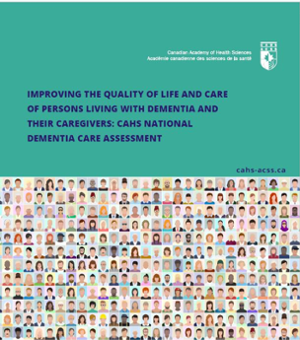
National Dementia Care Assessment recommends priorities for a Canadian Dementia Strategy
RaDAR Team Lead Dr. Debra Morgan is one of the six-member panel of multidisciplinary experts who compiled the report.
By RaDAR WebsiteA Canadian Academy of Health Sciences expert panel on dementia released their report January 16, 2019 outlining priorities for a national dementia strategy. Visit CAHS to download the Assessment.
The assessment entitled Improving the Quality of Life and Care of Persons Living with Dementia and their Caregivers was conducted by a six-member panel of distinguished multidisciplinary experts including Dr. Debra Morgan, PhD, RN, FCAHS, Chair, Rural Health Delivery at the Canadian Centre for Health and Safety in Agriculture, University of Saskatchewan. The panel is chaired by Dr. Howard Bergman, MD, FCFP, FRCPC, FCAHS, Chair of the Department of Family Medicine at McGill University.
The Public Health Agency of Canada charged the panel with providing an evidence-informed and authoritative assessment on the state of dementia knowledge to help advance and inform the development of a National Dementia Strategy.
The Assessment found that the quality of life of persons living with dementia and their caregivers, along with access to health and social care, can be improved across all stages of dementia.Based on the best evidence and emerging best practices, the Assessment recommends that the development of a national strategy on dementia consider the following seven priorities:
- Engaging persons living with dementia
- Prevention, awareness and living well with dementia
- Improving health and social care for persons living with dementia
- Education and support for caregivers
- Building and supporting the health and social care workforce
- Creating and translating knowledge on dementia
- Supporting research and innovation in all stages of dementia
The Assessment emphasizes the importance of a national strategy for ensuring the sustainability of Canada’s health and social care system in face of the increasing number of people living with dementia. It highlights the importance of adopting healthy lifestyles that might prevent or delay dementia along with the need to overcome stigma and fear of living with dementia and how it is possible to live well with dementia.
Improved quality and access to care for those living with dementia and improved supports to caregivers were stressed as well as the need to invest in dementia research and innovation across all areas of dementia - biomedical, clinical as well as research related to health systems, health services and population health.
The expert panel presents best practices on the implementation of dementia strategies, noting the importance of strong leadership, long-term commitment, standards of care and continuous improvement.
For more information please contact: Dr. Debra Morgan
Dementia in Canada:
- Dementia impacts women more than men. Of the over 400,000 people living with Dementia in Canada, over two-thirds (more than 265,000) are women. Studies suggest that about 90 percent of the dementia workforce is made up of women.
- Dementia has many faces and affects persons of every culture, ethnicity, religion, citizenship, sexual orientation and ability. However, certain populations face unique challenges. For example, the prevalence of dementia is 34 percent higher in Canada’s First Nations populations; it is increasing at faster rates and its onset is 10 years earlier compared to the general population.
- Rural older adults with dementia face multiple disparities accessing health care services, such as fewer services, greater travel distances, lack of transportation, lower availability of highly trained staff, and difficulty providing continuing education to health care providers.

